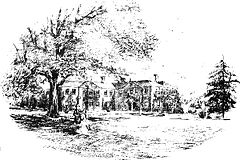Thornbridge Hall
| Thornbridge Hall | |
|---|---|

Thornbridge Hall in 1871
|
|
| General information | |
| Town or city | Great Longstone |
| Country | England |
| Coordinates | 53°14′06″N 1°42′18″W / 53.234959°N 1.705112°WCoordinates: 53°14′06″N 1°42′18″W / 53.234959°N 1.705112°W |
| Client | Longsdon family |
Thornbridge Hall is a large English country house situated near the village of Great Longstone in the local government district of Derbyshire Dales in Derbyshire. It is a grade 2 listed building.
From the 12th to the late 18th century, Thornbridge Hall was the seat of the Longsdon family. In 1790, John Morewood bought Thornbridge Hall for the then very large sum of £10,000. He made his money exporting linens from Manchester to St Petersburg in Russia. The Morewood family considerably enlarged the house. In 1859, Frederick Craven rebuilt the house in Jacobean style and installed the William Morris/Edward Burne-Jones window in the Great Hall.
In 1896, George Marples, a Sheffield businessman and lawyer, extended the house to nearly its present form, built lodges and cottages, landscaped the park and gardens, added his own private railway station, and acquired the Watson buffet fountain from Chatsworth House.
From 1929, Charles Boot, the Sheffield entrepreneur who designed and built Pinewood Studios, added items from Clumber Park and panelling from Derwent Hall. His company, Henry Boot Construction, was contracted to demolish Clumber after a fire in 1938. It was Boot who was responsible for bringing the many items to Thornbridge, although most were lost to private buyers through auction. Thornbridge Hall is now home to a vast array of statues, facades and fountains originally belonging to Clumber.
Sheffield City Council took over the house in 1945 and it became a teacher training college, Thornbridge Hall College of Education. At this time the house was of sufficient note that a Great Western Railway GWR 6959 Class steam locomotive – No. 6964, built in May 1944 – was named Thornbridge Hall in June 1947. It was withdrawn from service in September 1965 and later scrapped at T. Ward in Beighton, Sheffield. In later years, the hall was used as an educational and conference centre by the council, providing residential facilities for teachers and pupils in the house itself and in various outbuildings.
...
Wikipedia
